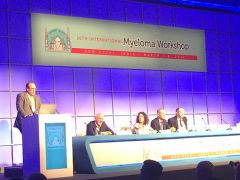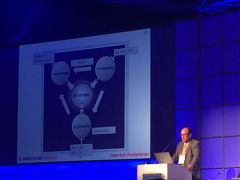Hundreds of medical oncologists, hematologists and myeloma specialists from around the world converged in New Dehli, India for the 16th International Myeloma Workshop March 1-4, 2017.
This bi-annual conference highlights all aspects of multiple myeloma research and care, ranging from developments and discoveries related to the underlying biology driving the multiple myeloma to the most promising new treatment approaches for multiple myeloma. Additionally, research advancements across the entire spectrum of basic science, preclinical models and clinical trial results are presented at the Workshop.

âOver the past few years, weâve entered an era where there are many FDA-approved treatment choices for multiple myeloma,â said Dr. Niesvizky. âThis is good news for patients overall, but how are we going to position the new drugs being developed in the already crowded space? And, what are the available choices for patients whose disease is not longer responding to the FDA-approved treatment options?âDr. Ruben Niesvizky, Director at the Weill Cornell Myeloma Center, was invited to speak at the 16th International Myeloma Workshop to present on promising agents for patients with relapsed or refractory myeloma that are currently in phase II clinical trials.
New classes of drugs approved in recent years include proteasome inhibitors, immunomodulating agents (IMiDs), histone deacetylase inhibitors and monoclonal antibodies.

Additionally, Dr. Niesvizky spoke about next generation immunomodulating agents such as the pleiotropic pathway modulators, the second and third generation oral proteasome inhibitors and the newer HDAC6 inhibitors that are under development in the laboratory as well as in phase I and II clinical trials. These treatments have shown potential efficacy alone or in combination when used against myeloma cells lines that are resistant to treatment with the existing FDA-approved agents in these categories."As patients develop treatment resistance and their myeloma is in a refractory state, the primary goal is to alter the resistance to these agents,â Dr. Niesvizky explains. âTo overcome multi-drug resistance, there are both newer drugs and older drugs that can be used. For example, by adding the antibiotic clarithromycin to the combination treatment of pomalidomide and dexamethasone, we can dramatically improve responses, and have seen double the response rate compared with standard pomalidomide and dexamethasone alone."
Dr. Niesvizky sat down with eCancer to share highlights from his presentation at the 16th International Myeloma Workshop and to discuss the latest scientific updates related to myeloma care. Watch the full video of the interview.
Learn more about open clinical trials at the Weill Cornell Medicine Multiple Myeloma Center for patients with relapsed and refractory disease.

